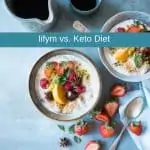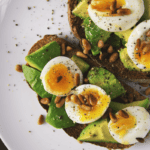While a lot of keto blogs may tell you that nuts are a staple in your new diet, not many coaches, mentors, or blogs will tell you that nuts may be keeping your back from reaching ketosis. If you’re looking to achieve ketosis, it’s important that you understand which nuts are the most nutrient-dense and friendly to the ketogenic diet.
Nuts are marketed as being a great thing to eat on the keto diet because they have higher fat content and they taste good, while also being marketed as being extremely healthy. While you can absolutely have nuts on the keto diet, but it’s best for you to eat nuts with some prior knowledge under your belt so you can weigh both the pros and cons of eating nuts based upon your personal lifestyle.
Depending upon your health goal, you may want to limit the amount the nuts you’re eating on a daily basis simply because you’re trying to lose weight. However, if you’re following along with the keto diet, having a high fat intake is crucial to losing weight, but make sure that you’re eating nuts that are higher in fat and not high in carbs.
Topic Contents
Pros vs Cons of Nuts
| Pros of eating nuts | Cons of eating nuts |
| High in nutrients | High in calories |
| Convenient to eat | Can be high in carbs |
| Anti-inflammatory | Easy to overeat with |
| Low in carbohydrates (when eaten in moderate quantities) | Contain anti-nutrients |
| Can be filling if you eat nuts with higher fat intake | Can be cooked in a lot bad chemicals |
Pros of eating nuts on a keto diet
Nuts have amazing macros, when you’re looking at the fat intake on a The Keto Diet: The Complete Guide to a High-Fat Diet. The healthy fats that are in nuts help you to stay fuller for a longer period of time, as well as maintain a state of nutritional ketosis. If you make the right choices in your nuts, you’ll be consuming mostly fat.
However, not all nuts will provide you with the same fat intake; a handful of dry roasted almonds (a typical handful is one ounce) will provide you with 14 grams of fat, while a handful of macadamia nuts will provide you with 21 grams of fat.
If you choose the right nut, nuts are low in carbohydrates when eaten in moderate quantities. Nuts are low-carb snack and great for a ketogenic diet, generally speaking when compared to their fat content.
An ounce of almonds has 2.9 grams of net carbs for 14 grams of fat, while as macadamia nuts have 1.5 grams of net carbs per 21 grams of fat. It’s also important for you to count the net carbs over the total carbs because nuts contain fiber which is indigestible.
This means that net carbs refer to the number of carbs that is usable by the body. Nuts are also high in nutrients, as they contain a great dose of minerals and vitamins that are great for your health, including some vitamins and minerals that aren’t commonly found in other foods, such as magnesium, manganese, and selenium. Nuts also contain a lot of dietary fiber, which is a rarity in other high fat keto foods.
But, one of the best parts about nuts for the keto diet is how convenient they are! Even places like gas stations have nuts, so they’re a great snack on a keto diet when you’re on the good and are a great alternative to buying other snacks like chips that will take you out of ketosis.
Keeping yourself fed while you’re on the go will help to maintain your willpower while you’re on the keto diet, as it’s incredibly important that you don’t find yourself in the situation where you’re starving and you reach for something that will ruin your ketosis.
Nuts can help make your transition to your low-carb diet plan or ketogenic diet at the very beginning because nut flours make a great substitute for wheat or other grains in baked goods or bread. However, you should limit yourself to these and should only be used when you’re getting through the tough period going into fat burning.
Nuts are also anti-inflammatory and can even help you to reduce the risk of type two diabetes, heart disease, and inflammation in the body, because of their fiber, magnesium, polyunsaturated fats, and L-arginine. Nuts also provide people with antioxidants that help to protect the body, but this is only a serious concern if you’re eating a large amount of nuts on a daily basis.
Cons of eating nuts on a keto diet
While nuts are great for you if you’re on the keto diet, they aren’t so great if you make poor decisions about the nuts you’re choosing on your diet. Nuts are extremely high in calories, but they’re also extremely easy to over eat.
A typical serving of nuts is just a handful, which is easy to down in a matter of seconds. Yes, there are nuts out there that are low in carbs, but too many servings of these nuts will increase your carb intake greatly.
A lot of nuts are salted and roasted in oil, which makes them even more appealing to our taste buds, which leads to overeating or accidentally binging on them. Overeating on these nuts can lead to weight gain and will kick you out of nutritional ketosis. If you happen to find yourself struggling to monitor your nut intake, maybe you can just stay away from the nuts altogether.
Despite all of the nutritional benefits that nuts contain, they also have a lot of phytic acids, which prevents the absorption of calcium, iron, and zinc in your body. This acid can also make it difficult to eat for some people, which is why you may want to only eat nuts that are sprouted, roasted, and soaked.
Whether or nut you’d like to include diet nuts into your ketogenic diet is all up to your individual choice. Make sure to keep track of your caloric intake, your carb content, and the macronutrients you’re eating. If you do decide you’d like to have nuts in your diet, focus on eating low-carb foods and high-fat nuts like brazil nuts, macadamia nuts, or eating =nuts that are high in carbs in moderation.
Nuts aren’t an essential part of maintaining a ketogenic diet, so if you notice that you’re starting to gain weight, that they’re taking you out of the ketogenic diet, or causing you digestive problems, your best option may be the cut the nuts out of life altogether. It’s really just about finding what will work for you over a long period of time.
What are the best nuts to eat on the keto diet?
| Low carb nuts | High carb nuts |
| Pecans – 1.1 grams of carbs / 1 ounce | Almonds- 2.9 grams of carbs/ 1 ounce |
| Brazil nuts- 1.3 grams of carbs/ 1 ounce | Peanuts- 3.8 grams of carbs/1 ounce |
| Macadamia nuts- 1.5 grams of carbs/ 1 ounce | Pistachios- 5.8 grams of carbs/ 1 ounce |
| Hazelnuts- 2.3 grams of carbs/ 1 ounce | Cashews- 8.4 grams of carbs/ 1 ounce |
| Pine nuts- 2.7 grams of carbs/ 1 ounce | Chestnuts- 13.6 grams of carbs/ 1 ounce |
Almonds– Provides 37% of the recommended dietary allowance of Vitamin E with 6.1 total grams of carbs, 3.5 grams of fiber, and 2.6 grams of net carbs. Almonds can help to improve heart health markers.
Brazil nuts– These nuts are extremely high in selenium, which is a mineral that helps to maintain a healthy thyroid function.
One brazil nut provides more than 130% of your daily requirement for selenium, but in order to avoid potentionally toxic levels of selenium, you should limit your intake to just a few brazil nuts a day. Brazil nuts also help to reduce inflammation; 3.5 grams of carbs, 2.1 grams of fiber, 1.4 grams of net carbs.
Cashews– This nut provides 31% of your recommended daily intake for copper, but cashes do happen to have the a lot of carbs. Cashews can help to lower you cholesterol levels, if eaten on a daily basis. Total carbs for a one ounce serving is 8.6 grams, 0.9 grams of carbs of fiber, and 7.7 grams of net carbs.
Hazeulnuts– One serving of hazelnuts contains a quarter of your daily requirement for Vitamin E. Matter of fact, this nut help to improve your lipid profile if eaten on a daily basis. Total carbs per a serving is 4.7 grams, 2.7 grams of fiber, and 2 grams of net carbs.
Macadamia nuts– Macadamia nuts are the highest in monounsaturated fat than any other nut in the world, while also bring the highest in overall fat. 78% of the fat found in macadamia nuts consists of monounsaturated fatty acids that are healthy for your heart.
If eaten on a daily basis, macadamia nuts can help raise your HDL and lower your LDL. Total carbs per serving is 3.9 grams, 2.4 grams of fibers, 1.5 grams of net carbs.
Pecans– Pecans are great to eat for antioxidant protection and are the lowest in net carbs. Pecans are a great source of zinc, too! 2.7 total grabs of carbs, 2.7 grams of fiber, 1.2 grams of net carbs.
Pistachios– One serving of pistachios will provide you with 24% of your daily requirement for Vitamin B6. Pistachios also help to improve your blood sugar, helping to make them more stable, which is extremely beneficial to people who have type two diabetes. Per a serving of pistachios, you will eat 7.9 total grams of carbs, 2.9 grams of fiber, and 5 grams of net carbs.
Walnuts– Walnuts contain more anti-inflammatory omega-2 fatty acids than any other nut in the world. Eating walnuts on a daily basis can help to lower your LDL and can help to improve the functioning of your arteries. For one serving of walnuts, your total carb intake is going to be 3.9 grams of carbs, 1.9 grams of fiber, and 2 grams of net carbs.
You’re going to want to focus on eating nuts that are lower in carb count, as these are much safer to eat because their high-fat diet content makes them much more satisfying to enjoy and harder to overeat with. However, you should be mindful of all of the carb intake for each nut that you’re eating and remember to continue monitoring your keto levels to see if anything changes.
Nuts provide a low to a moderate amount of carbohydrates, depending on what type of nuts you eat. In many cases when you’re eating nuts, more than half of the carbs that you’re eating are fiber, which doesn’t increase your blood sugar or put you at risk of leaving ketosis.
Unlike carbohydrates, fiber isn’t digested and absorbed in your small intestine, because of the way that the bonds of fiber are arranged. Humans don’t have the enzymes that are needed to break down the bonds fiber has in order to allow it to be absorbed.
Once the fiber passes through your small intestine, it enters your colon. Once it’s in your colon, it either passes in your stool or dissolves in water. Insoluble fiber passed through your colon and adds on to your stool, so it doesn’t have any calories at all.
Around 70%-75% of the fiber that’s found in nuts is insoluble. Soluble fiber dissolves in water and forms a gel that aids in the movement of food through your digestive tract, which can help you feel fuller for a longer period of time.
Frequently Asked Questions
Can I eat peanut butter instead? And how much?
Yes, you can eat nut butter when you are on a keto diet but you can not entirely replace it with nuts because you have to limit your intake to around 50 grams per day which will contain roughly 200 calories, 17 grams of fat, 9 grams of protein, and 8 grams of carbs.
Conclusion
Nuts can be an extremely convenient tool for a nutrient-dense [ketogenic diet, but they can be a double-edge sword that can be one of those things that hold you back from achieving your health or weight loss goals. Find the right nuts for your body, such as high fat and a low-carb nuts, and always be mindful of how much you are eating.
If you are looking to lose weight, consume your nuts and seeds in moderation. Remember that you don’t absorb all of the calories that we eat in nuts, although we still do get a fair amount of the nutrients. When eaten in large quantities, nuts can drastically slow down weight loss and can even lead to weight gain. Most types of nuts are great for keto diets when consumed in moderation.
If you’ve been avoiding nuts because you believe that they’re too high in carbohydrates, take a while and consider adding them back into your diet, as they can improve your health and make your keto lifestyle even easier and delicious.
Alt Protein Team is a team of professionals and enthusiasts committed to bringing you the most up-to-date information on alternative protein, health and wellness, workouts, and all things health-related. We’ve reviewed a lot of products and services so you don’t have to guess when you spend your hard-earned money on them. Whether you want to shed some pounds, build lean muscle or bulk, we can help you figure out what you need to do and what you need to have to achieve your goals.










